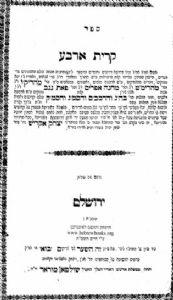A Short Tribute
Hacham Yitzhak Akarish, son of Abraham, was born in Kushta (Istanbul) in 1818. He studied and taught Torah at the Abraham Pu'ah yeshiva in Kushta, where Hacham Shlomo Eliezer Alfandari also taught, and had many students. He was a halachic adjudicator and his responsa dated between 1842 and 1872 were published in his book, Kiryat Arba.
In 1858, banker Abraham Di Camondo, who had significant influence in the sultan's court, founded a Jewish school where languages, secular disciplines and trades were taught. Hacham Yitzhak Akarish and Hacham Shlomo Kimchi, author of Yemei Shlomo, opposed the school's opening and excommunicated those who sent their children there to study. Their position was contrary to Hacham Bashi (Chief Rabbi) Moshe Hacohen and the community leadership, who were in favor of opening the school. At the height of the conflict, Hacham Yitzhak Akarish burst into Di Camondo's palace and, to the sound of ram's horns, declared his excommunication. The Hacham Bashi ordered that he be imprisoned – in comfortable conditions - for a day. His arrest, however, was humiliating. He was bound in ropes, and thrown into jail with common criminals. The event shocked the Jewish community, and on the following Friday, some forty thousand Kushta Jews marched in prayer and protest on the road that served as Sultan Abed El Azziz's route to the El Ayoub mosque, demanding his release. The sultan complied and Hacham Akarish was brought home, lifted on the raised arms of the crowd.
The conflict between Hacham Yitzhak Akarish and Hacham Bashi Moshe Hacohen intensified and continued even after the latter's death and the appointment of Hacham Yaakov Avigdor in his stead. In 1862 the Ottoman government intervened and convened a rabbinic court in Kushta that included Izmir's Hacham Bashi Haim Palagi and Adrianople's Hacham Bashi Yakir Giron. Hacham Yakir Giron was appointed Hacham Bashi of Kushta, and the rabbinic court approved the school's opening with certain stipulations. Hacham Yitzhak Akarish, who maintained his position, was forced to leave Kushta. He eventually immigrated to the Land of Israel (1874) and settled in Hebron.
Hacham Yitzhak Akarish passed away in suffering, on 28 Elul 1886, and was buried on the Mount of Olives. His book, Kiryat Arba, which contains sermons, original commentary, and responsa, was published in Jerusalem in 1876.
